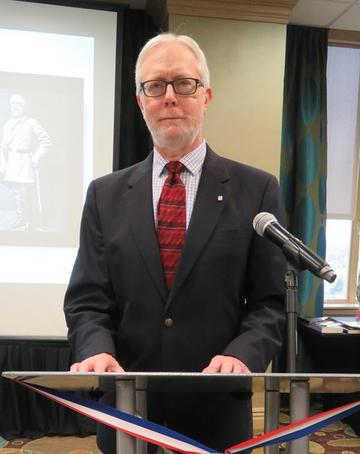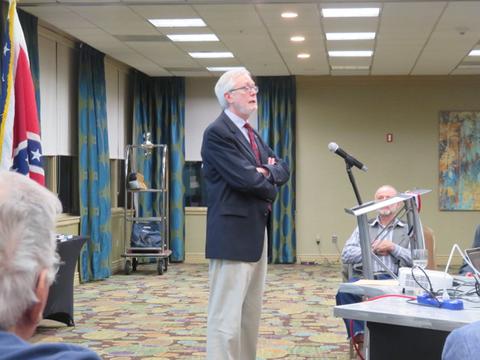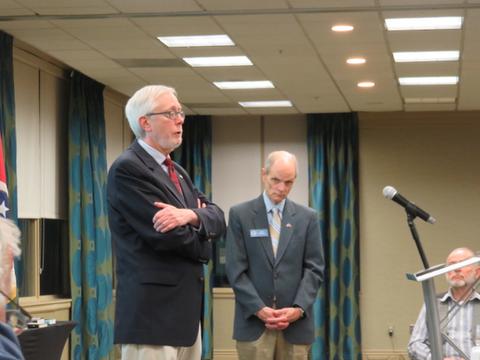April 2019 Meeting

At the April 2019 meeting, Dr. William G. Piston, Professor Emeritus, Missouri State University in Springfield MO, gave an excellent presentation titled: "Lee and the Lost Cause Myth." A summary of Dr. Piston's presentation is as follows:
- The term "Lost Cause" was first used by Edward A. Pollard, Virginia journalist and editor of the Richmond Examiner, which was very pro-southem, but anti-Jefferson Davis. In 1866, Pollard wrote a book titled: The Lost Cause: A New Southern History of the War of the Confederates. In his book, Pollard viewed the war as between two opposing ways of organizing society and saw slavery as a key part of the nobility of the South and a key basis of the difference between the societies.
- Rollin G. Osterweis, professor of history at Yale University, wrote The Myth of the Lost Cause, 1865-1900 in 1973. He wrote that southerners tried to put a positive spin on the war. Distortion of the truth was not always deliberate. The "Lost Cause" myth exaggerates some facts and makes southerners blameless as to the cause of the war. The South claimed that states' rights and not slavery was the cause of the war. The South left the Union to keep slavery and maintain white supremacy. The South believed that the Civil War was caused by northern aggression and especially by the abolitionists. Twenty years after the war, there was real nostalgia about the war, which led to The Century Magazine publishing a series of articles about battles and leaders of the Civil War.
- Thomas L. Connelly wrote The Marble Man: Robert E. Lee and His Image in American Histotr in 1977. Connelly's book was veiy controversial. He wrote that the Civil War was won in the west. The South lost the war because Lee concentrated on the war in Virginia. The veneration of Lee was not an unconscious act. It was started by Jubal Early, John William Jones (former Confederate chaplain), William Nelson Pendleton, and Edward Porter Alexander. They created the Southern Historical Society Papers, which were used to defend Lee's reputation.
- Charles Reagan Wilson wrote Baptized in Blood: the Religion of the Lost Cause, 1865-1920, in 1980. Wilson looked at veteran organizations such as the United Confederate Veterans (UCV), which was organized in 1889. The UCV functioned as a fraternal organization and took on the trappings of religion, including ceremonies, uniforms, etc. They deliberately linked southern leaders with Biblical figures. Differing opinions were treated as heresy.
- Dr. Piston wrote Lee’s Tarnished Lieutenant: James Longstreet and his Place in Southern History in 1987. Jubal Early and others blamed Longstreet for the Confederate loss at Gettysburg. They despised Longstreet and wanted to erase him from Confederate history, because Longstreet dared to criticize Lee and because he became a republican "scalawag." Longstreet was frustrated by being blamed for Gettysburg and was jealous of Lee and Stonewall Jackson later in life. After the war, Longstreet became adjutant general of Louisiana and head of the militia. He accepted that African-Americans would play a bigger role in the legislature and he would work with them.
- Carol Reardon wrote Pickett’s Charge hi History & Memory in 2003. She wrote about the futility of the Confederates charging a strong position. The failure of Pickett's charge resulted in an intense blame game. North Carolina troops believed that they were unfairly blamed and that Virginia units got all of the press coverage. Southerners absolved Lee by blaming Longstreet. In their opinion, the South was not a failure, but showed unsurpassed valor against overwhelming odds.
- Wallace Hettle wrote Inventing Stonewall Jackson; A Civil War Hero in History & Memory in 2011. Hettle said Jackson was viewed as an Old Testament man of wrath and his eccentricities were emphasized.
Dr. Piston said the "Lost Cause" was not something simple. Subsequent writers of "Lost Cause Myth" overviews include Edward H. Bolienkemper, William C. Davis, Gaines M. Foster, Gaiy W. Gallagher, and Allan T. Nolan. Dr. Piston said there has been a growth of Civil War "memory studies."
In summary, Dr. Piston said the Civil War was a cultural shock, almost beyond our understanding. There was a tremendous loss of life and disruption to both the white and African-American societies.

Dr. Piston and Round Table member and friend, Chris Edwards


|
| |